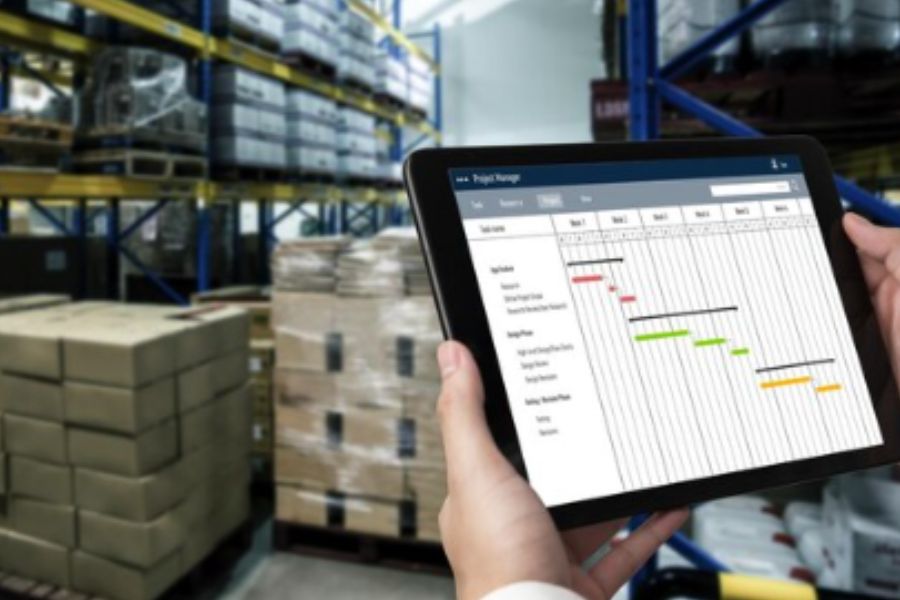How can small businesses elevate their success? Inventory management software for small businesses is a significant component of running your business efficiently.
How well is your small business handling its inventory? Have you consistently had the right products in stock when customers needed them? Have you ever missed out on sales due to stockouts? Or have you found yourself losing money due to having too much unsold inventory?
This guide outlines when small businesses should consider adopting inventory management software, its key advantages, potential pitfalls, and expert tips for selecting the right solution.
Highlight:
- Inventory management software streamlines processes, reduces errors, and enhances decision-making, boosting efficiency and profitability for small businesses.
- Although beneficial, potential challenges include costs, staff resistance, and integration with legacy systems, which must be considered prior to implementation.
When Should Small Businesses Consider An Inventory Management Software?
Small businesses should start evaluating inventory software once they experience:
- Inventory Errors Are Costing You Sales: If you’re frequently running out of popular products or overstocking items that don’t sell, you’re likely losing money. Inventory management software for small businesses provides real-time tracking and automated alerts, enabling you to maintain optimal stock levels.
- Your Product Range Is Expanding: As your business grows and adds more SKUs or product lines, manually tracking inventory becomes inefficient and prone to errors. A software solution provides structured oversight and ensures scalability without compromising accuracy.
- Order Fulfillment Is Slowing Down: Delays in picking, packing, and shipping can stem from disorganized inventory practices. Inventory software optimizes these processes by organizing product locations, automating reorder points, and cutting fulfillment time.
- You Lack Visibility into Inventory Performance: Understanding which items are top performers and which are tying up capital is key to profitability. Inventory management software for small businesses provides reporting and analytics tools that give you clear insight into trends, demand cycles, and financial impact.
- Manual Processes Are Wasting Time: Time-consuming tasks, such as data entry, stocktaking, and invoice matching, can significantly drain productivity. Automating these functions with inventory software frees up your team to focus on sales and customer service.
Pros of Implementing Inventory Management Software for Small Businesses
Utilizing inventory management software for small businesses yields measurable improvements in efficiency, cost control, and customer satisfaction.
Below is a detailed breakdown of the key advantages:
Real-Time Tracking
Inventory management software enables real-time visibility into stock levels, movements, and locations. This confirms small business owners can immediately spot low stock, avoid overstocking, and better serve customers without delay.
Real-time data also enhances collaboration between departments and improves supply chain responsiveness.
According to a report by Wasp Barcode Technologies, 46% of SMBs either don’t track inventory or use a manual method, leading to significant inefficiencies and missed opportunities for real-time insights.
Enhanced Accuracy and Reduced Human Error
Manual processes are susceptible to errors, such as data entry mistakes or miscounted stock, which can result in lost sales or unnecessary expenses. Software solutions automate these tasks, significantly improving accuracy. Barcode scanning, automated counting, and synced data reduce the likelihood of errors and enhance overall reliability.
►►► Optimal solution set for businesses: Multi store POS, Next-gen POS, Inventory Management Software (MSI), Self Service, Automation, Backorders
For example, a boutique clothing store that switched from spreadsheets to barcode scanning via inventory software reduced stock count discrepancies by 90% within three months.
Better Forecasting and Decision Making
With access to historical sales data and predictive analytics, inventory management software helps small businesses make more informed purchasing and stocking decisions. It enables better demand forecasting, helping avoid surplus stock and missed sales opportunities due to understocking.
A small organic grocery store uses sales history and seasonal trends from its inventory system to predict higher demand for pumpkin products in October, allowing for more accurate purchasing.
Streamlined Order Management
These systems centralize and automate the ordering process by syncing with suppliers, setting reorder points, and managing backorders. Small businesses can reduce lead times and enhance order fulfillment accuracy, ensuring customers receive their products promptly.
Time and Cost Savings Over Time
Automating routine tasks and decreasing manual labor, businesses save time that can be redirected to higher-value activities like marketing or customer service. Also, reduced inventory waste, better order accuracy, and improved efficiency contribute to long-term cost savings.
Scalability for Growth
As small businesses expand, manual inventory methods often struggle to keep up. Inventory management software scales with the business, handling increased stock, more sales channels, and additional warehouses without needing a complete system overhaul. This makes it easier for small businesses to grow sustainably.
Challenges of Implementing Inventory Management Software for Small Businesses to Watch Out For
While inventory management software offers significant benefits, implementing it can come with challenges, especially for small businesses. Understanding these potential hurdles can help businesses prepare and navigate the transition more effectively.
Initial Costs and Subscription Models
The upfront cost of purchasing and implementing inventory management software can be a major barrier for small businesses. Additionally, subscription-based models can incur ongoing monthly or annual expenses that may strain tight budgets.
A small clothing store may be deterred from using sophisticated software like TradeGecko (now QuickBooks Commerce) because the subscription fee may seem high, especially for a business with a limited inventory turnover.
Staff Training and Resistance to Change
Implementing new software often requires training employees to use it effectively. Resistance to change can arise, particularly from staff who are comfortable with existing methods or fear that the new system may be too complex.
A small family-owned bookstore might face resistance from staff who have been using a paper-based tracking method for years. They may find the transition to a more digital system overwhelming, which can lead to temporary productivity dips or errors.
Integration Issues with Legacy Systems
Small businesses may already have other systems in place for accounting, customer management, or sales. Integrating new inventory management software with these existing systems can be complex and may require additional technical expertise.
A small restaurant using an outdated point-of-sale (POS) system may struggle to integrate it with new inventory management software, such as Square for Restaurants, potentially causing delays and data discrepancies.
Overcomplication for Small Inventories
Some inventory management software solutions are designed with large businesses in mind and may come with too many features for small businesses, making them unnecessarily complex.
For example, a small jewelry shop may find that an advanced system like SAP Business One offers more features than necessary, leading to confusion and inefficiency.
Data Security Risks with Cloud-based Systems
Cloud-based inventory management systems store data remotely, which can raise concerns about data security. Small businesses may be particularly vulnerable if they lack the resources to implement robust cybersecurity measures.
A boutique could face risks if its cloud-based system is hacked, leading to potential loss of sensitive customer or inventory data.
Tips for Selecting the Best Inventory Management Software for Small Businesses
Choosing the right inventory management software for small businesses can be a daunting task with the multitude of options available. However, with the right strategy and careful consideration, you can find a solution that not only meets your current needs but also scales with your business as it grows.
We’ll look into some expert tips to guide you in selecting the best inventory software for your business.
- Define Your Business Objectives
Before diving into software options, clearly define your business objectives and inventory needs. Do you need to improve accuracy, track inventory across multiple locations, or streamline your ordering process? Understanding these goals will help you select software with the right features.
- Consult with Industry Experts
Seek advice from industry experts or consultants who can help you identify your business’s unique requirements. An expert can recommend inventory systems that are well-suited for your industry and size.
- Take Advantage of Free Trials and Demos
Many inventory management software providers offer free trials or demos. Take full advantage of these to test out the software and ensure it meets your needs. During the trial period, assess the usability, features, and whether it integrates smoothly with your existing systems.
- Select Scalable, Future-Ready Solutions
As your business grows, your inventory management needs will evolve. Select software that can scale with your business to accommodate an increasing number of products, locations, and users.
ConnectPOS is an excellent choice for small businesses that anticipate growth. It offers
- Real-Time Inventory Tracking: Whenever a sale is made, stock levels are updated instantly across all your sales channels, whether in-store or online. For small businesses, this feature helps ensure that you’re never caught off guard with stockouts or overstocking.
- Multi-location Inventory Management: If your business operates from multiple locations or has an online store, ConnectPOS offers multi-location inventory management. This feature allows you to manage stock across various physical stores and warehouses, as well as your e-commerce platform, all from a single interface.
- Automatic Stock Updates & Alerts: ConnectPOS ensures you never run out of stock unexpectedly with automatic stock updates. When stock levels reach preset thresholds, the system will send low-stock alerts to notify you that it’s time to reorder.
- Barcode Scanning: To simplify stocktaking, ConnectPOS supports barcode scanning, making it quick and easy to add new products or update existing inventory
- Leverage Feedback from Your Professional Network
Reach out to other business owners in your industry to get feedback on the software they use. Peer recommendations can provide valuable insights and help you avoid potential pitfalls.
- Prioritize Smooth and Strategic Deployment
Ensure that the software implementation is smooth and strategically planned. Consider the time and resources required for training staff, integrating the system with your current operations, and troubleshooting during the initial phase.
FAQs: Inventory Management Software for Small Businesses
- How much should a small business budget for inventory software?
Budgets can vary widely depending on features and company size. Expect to spend $50–$200 per month for cloud-based platforms, although enterprise-level tools may cost more. Always factor in setup fees, add-ons, and training costs.
- Can inventory software integrate with accounting tools?
Yes. Most reputable solutions integrate seamlessly with accounting software like QuickBooks, Xero, or Zoho Books, enabling smooth financial tracking and reporting.
- What industries benefit most from inventory systems?
Industries like retail, food and beverage, manufacturing, healthcare, fashion, and e-commerce benefit significantly. Any sector dealing with high SKU turnover or multiple sales channels can optimize operations using inventory software.
Conclusion
In sum, inventory management software for small businesses is a game-changer in optimizing operations, reducing errors, and ensuring growth. With its numerous benefits, including real-time tracking and scalability, adopting the right system is significant.
ConnectPOS offers seamless integration, real-time updates, and multi-location management, making it an ideal choice for businesses. Contact us today to learn more about how ConnectPOS can elevate your business.
►►► Optimal solution set for businesses: Shopify POS, Magento POS, BigCommerce POS, WooCommerce POS, NetSuite POS, E-Commerce POS



